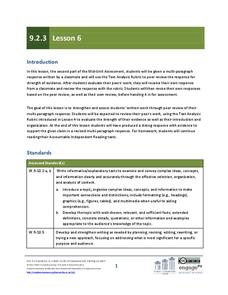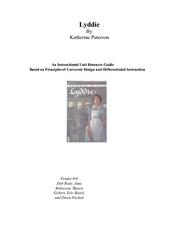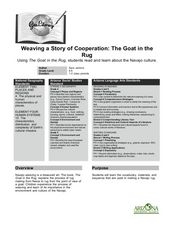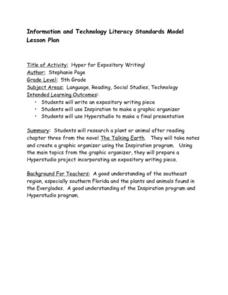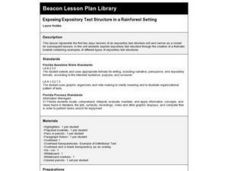EngageNY
End of Unit Assessment: Drafting the Informative Consumer Guide
Not all sandwiches are edible. Scholars use a Quote Sandwich graphic organizer to draft the written content of their informative consumer guides. Additionally, they view a mini-lesson on formal writing.
Curated OER
Mealworms
Crawl into the world of the darkling beetle with this scientific investigation. Watch as the insects move through the larval, pupal, and adult stages of life, recording observations along the way. Discuss the necessities of life as young...
Infobased Learning
Bloom's Literature: How to Write about Nineteen Eighty Four
A good prompt is hard to find, especially ones that encourage application, analysis, synthesis, and evaluation of a text. Help is here in the form of a prompt list for George Orwell's Nineteen Eighty Four that offers essay topics that...
EngageNY
Grade 9 ELA Module 2, Unit 3, Lesson 6
As part of a mid-unit assessment, class members exchange their draft of a multi-paragraph essay with a classmate, review their partner's writing using the provided text analysis rubric, and evaluate the strength of evidence, the...
Curated OER
Outlining
Students read and evaluate a piece of expository writing. They participate in a class discussion of the outlining process and individually outline a piece of expository writing. Finally, the students create an outline for the purpose...
Curated OER
Swimming With the Crabs
For this expository writing worksheet, students read an article about crabs and a graphic organizer with crab facts. Students fill in a graphic organizer, including their specific topic about crabs and details to support their topic.
Curated OER
Lyddie: An Instructional Unit Resource Guide
Katherine Paterson’s young adult novel Lyddie is the foundation of a differentiated instruction unit that not only explores the rise of industrialization and labor but women’s rights issues as well. After learners read the novel, they...
Curated OER
Weaving a Story of Cooperation: The Goat in the Rug
Weaving is an important part of Navajo culture. Read The Goat in the Rug to your fourth and fifth graders, and give them a glimpse into the process of rug making from the point of view of a goat! They will learn new vocabulary words and...
Curated OER
Hyper for Expository Writing!
Fifth graders use the internet to research a plant or animal they read about in "The Talking Earth". Using notes, they develop a graphic organizer and use the main topics to create a HyperStudio stack. Using all of this information,...
Curated OER
Narrative vs. Expository Texts
Young scholars use examples of narrative and expository text to analyze and compare the two styles. Students read articles on life in Lesotho and Madagascar and use graphic organizers and discussion to compare them. Young scholars write...
Curated OER
Build an Outdoor Compost Heap
Students study how to create a compost heap. For this composting lesson, students create a compost heap. Students write an essay describing the process.
Curated OER
The Rumpelstiltskin Story
Why didn't Rapunzel's hair stop growing? Why did it take the fairy godmother so long to intervene in Cinderella's affairs? Young writers consider unanswered questions like these and compose news articles investigating the true story...
Curated OER
Write Your Own Cultural Connections
Students write a cultural narrative. For this multicultural writing lesson, students create an expository narrative to teach others about their lives. Students complete the narrative and use a buddy editing strategy to revise their papers.
Curated OER
Exposing Expository Text Structure in a Rainforest Setting
Students create a thematic booklet containing examples of different types of expository text structures. They explore a variety of expository text structures.
Curated OER
Writing About the Zoo Trip
Second graders practice writing. In this five senses writing lesson plan, 2nd graders describe their experience on the field trip they took to the zoo. They work as a class and independently to come up with different things they saw,...
Curated OER
A River, Dead or Alive: Native Americans and European Colonists' Treatment of a River
Students write an expository paragraph about the uses of the Nashua River for the Native Americans and the European Colonists. In this river uses lesson plan, students determine the causes and effects of both parties using the river.
Curated OER
A Proposal to Lessen World Hunger
Fifth graders conduct research. They explore how to give an oral presentation with visual aids. Students have the opportunity to create a proposal which could help alleviate world hunger. They brainstorm different ways children could...
Curated OER
Using a Venn Diagram to Compare / Contrast: Double Bubble
Create a "Double Bubble" to organize information in a Venn diagram-like graphic organizer. There are a few options included to differentiate this assignment, but unfortunately, there are no topics for selection. Provide your emerging...
Curated OER
Using Details From The Text
Begin this expository writing activity by reading a non-fiction book of your choice and modeling expository writing. The plan suggests The Trip of a Drip by Vicki Cobb but notes that other texts will work. Learners then choose a...
Curated OER
Build a Tasty Sandwich
The subject doesn't sound to interesting, but with a child's imagination even a trip to the store can be an adventure. The class writes a narrative story about a trip to the store. They organize their stories to include an introductory...
Curated OER
Environmentally Friendly
What can your pupils do to promote better conditions for wildlife? After researching issues around wildlife management, class members use the Internet to locate three different organizations devoted to protecting wildlife. They then...
Curated OER
Developing Student Web Pages for Showcasing Research
Students employ information literacy skills to research topics. They develop topics using a graphic organizer. They draft, revise and edit research projects. They write an expository essay. They create a web page in Microsoft Publisher.
Curated OER
Synthesis of Information
Locating and synthesizing information is an essential part of the research process but can be overwhelming for many young writers. Eliminate some of the stress and confusion, this resource suggests, by separating these steps. To focus...





